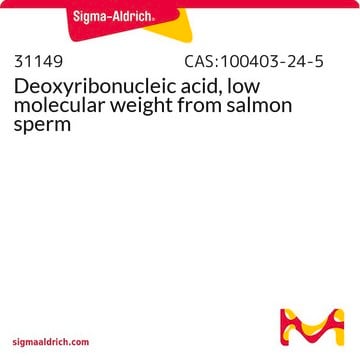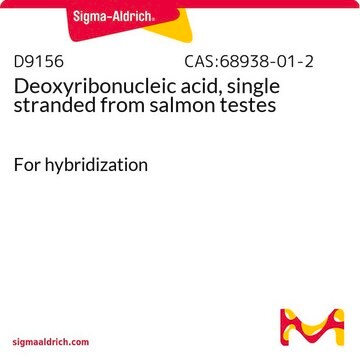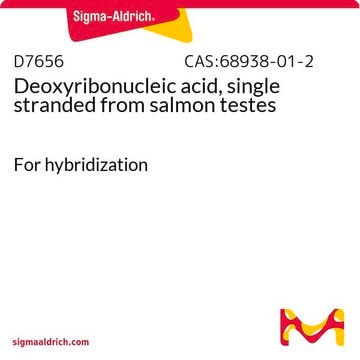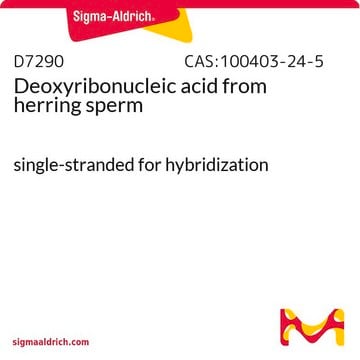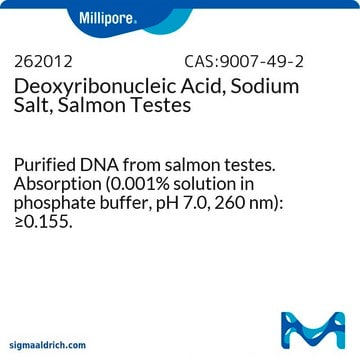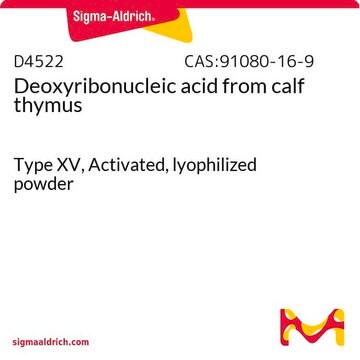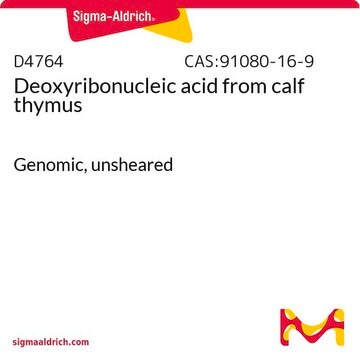D6898
Deoxyribonucleic acid sodium salt from herring testes
Type XIV
Synonyme(s) :
DNA
Se connecterpour consulter vos tarifs contractuels et ceux de votre entreprise/organisme
About This Item
Numéro CAS:
Numéro MDL:
Code UNSPSC :
41106305
eCl@ss :
32160414
Nomenclature NACRES :
NA.51
Produits recommandés
Vous recherchez des produits similaires ? Visite Guide de comparaison des produits
Catégories apparentées
Description générale
Deoxyribonucleic acid sodium salt from herring testes, also known as HtDNA is a natural source of DNA designed for DNA binding agent studies. The detection limits of HtDNA are around 5.0ng and linear ranges of light scattering intensity (I(LS)) is 0.05-2.5 mµg.
Application
Deoxyribonucleic acid sodium salt from herring testes is used in studies of DNA binding agents that modulate DNA structure and function. Herring testes DNA is also used in physicochemical studies of DNA behavior in solution.
Code de la classe de stockage
13 - Non Combustible Solids
Classe de danger pour l'eau (WGK)
WGK 3
Point d'éclair (°F)
Not applicable
Point d'éclair (°C)
Not applicable
Équipement de protection individuelle
Eyeshields, Gloves, type N95 (US)
Certificats d'analyse (COA)
Recherchez un Certificats d'analyse (COA) en saisissant le numéro de lot du produit. Les numéros de lot figurent sur l'étiquette du produit après les mots "Lot" ou "Batch".
Déjà en possession de ce produit ?
Retrouvez la documentation relative aux produits que vous avez récemment achetés dans la Bibliothèque de documents.
Les clients ont également consulté
X Du et al.
Talanta, 55(1), 93-98 (2008-10-31)
The interaction of histone with nucleic acids was characterized by light-scattering measurement using a common spectrofluorometer. Thereby, a sensitive and convenient method for the determination of nucleic acids was established. At pH 4.5-6.5, the interaction of histone with nucleic acids
Assaf Marcus et al.
Immunity, 49(4), 754-763 (2018-10-18)
Detection of cytosolic DNA by the enzyme cGAS triggers the production of cGAMP, a second messenger that binds and activates the adaptor protein STING, which leads to interferon (IFN) production. Here, we found that in vivo natural killer (NK) cell killing
Larisa I Labzin et al.
The EMBO journal, 38(21), e101365-e101365 (2019-08-31)
Inflammasomes are potent innate immune signalling complexes that couple cytokine release with pro-inflammatory cell death. However, pathogens have evolved strategies to evade this cell autonomous system. Here, we show how antibodies combine with innate sensors in primary human macrophages to
Gillian Dunphy et al.
Molecular cell, 71(5), 745-760 (2018-09-08)
DNA damage can be sensed as a danger-associated molecular pattern by the innate immune system. Here we find that keratinocytes and other human cells mount an innate immune response within hours of etoposide-induced DNA damage, which involves the DNA sensing
Renée M Van der Sluis et al.
PLoS pathogens, 16(2), e1008151-e1008151 (2020-02-29)
HIV latency is the major barrier to a cure for people living with HIV (PLWH) on antiretroviral therapy (ART) because the virus persists in long-lived non-proliferating and proliferating latently infected CD4+ T cells. Latently infected CD4+ T cells do not
Notre équipe de scientifiques dispose d'une expérience dans tous les secteurs de la recherche, notamment en sciences de la vie, science des matériaux, synthèse chimique, chromatographie, analyse et dans de nombreux autres domaines..
Contacter notre Service technique

